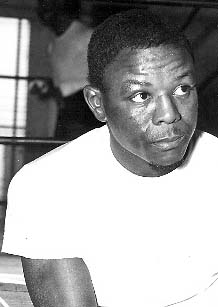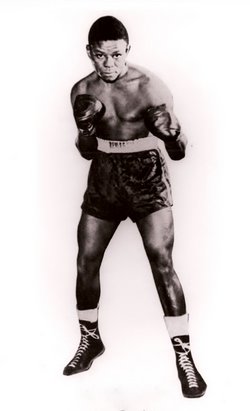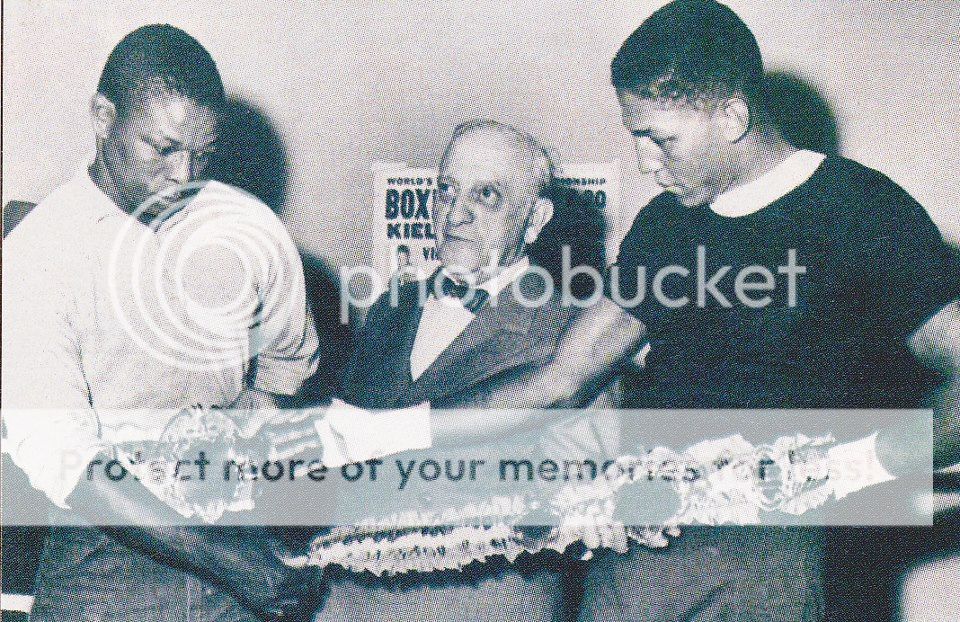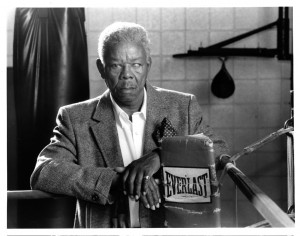Juan Félix "Tito" Trinidad García (born January 10, 1973) is a retired Puerto Rican professional boxer, considered one of the best in Puerto Rico's history. After winning five National Amateur Championships in Puerto Rico, he debuted as a professional when he was 17. He won his first world championship when he defeated Maurice Blocker for the International Boxing Federation's welterweight belt. Trinidad holds the record for second most welterweight title defenses . However, Trinidad holds the record for longest reign as Welterweight Champion, six years, eight months and fourteen days. During his career he fought Oscar De La Hoya winning the Lineal and World Boxing Council welterweight champion, Fernando Vargas in a unification fight where he won the International Boxing Federation's light middleweight title, and William Joppy for the World Boxing Association's middleweight championship. He lost to Bernard Hopkins by technical knockout and retired for the first time. Trinidad returned to action in a fight against Ricardo Mayorga and, following a fight against Winky Wright, retired a second time. In 2008, he returned to the ring to fight Roy Jones, losing the contest by unanimous decision. Subsequently, Trinidad entered a five-year hiatus without clarifying the status of his career.
Trinidad debuted as a professional on March 10, 1990, when he was 17 years old. The fight was against Angel Romero, another debuting boxer, in a contest that Trinidad won by knockout in the second round. In the beginning of his career he knocked out nine of his first 10 opponents. He then competed against more experienced boxers like Jake Rodriguez, whom he fought on December 6, 1991. Trinidad won the fight by unanimous decision but suffered an injury on his right hand. He was then inactive for five months while recovering from the injury.
Trinidad traveled to San Diego, California and defeated the IBF welterweight champion Maurice Blocker in two rounds, in a fight card that took place on June 19, 1993, televised by Showtime. Trinidad spent the first two minutes of the fight analyzing Blocker's style. With 11 seconds left in the first round, one of Trinidad's punches injured Blocker, who barely survived the round. In the second round, the champion's condition appeared to improve, but after the first 30 seconds, another Trinidad punch injured him. Trinidad followed with a combination, scoring a knockout at 1:49 in the round when the referee stopped the fight. Afterwards, tournament organizer Don King's exclusive relationship to stage fights for the cable channel Showtime meant that Trinidad would be showcased regularly on Showtime Championship Boxing.
Trinidad defended his title for the next three years against several opponents. Trinidad's first fight in Las Vegas was against Héctor Camacho on January 29, 1994. He was cautious during the first rounds and received a cut over his left eye. In the third round he connected a solid combination that made Camacho change to a defensive stance. Throughout the fight Trinidad was on the offensive and won the fight by unanimous decision, in what was his first decision since he won the world championship. The scores awarded by the judges were 117–109, 116–110, and 119–106.
On September 17, 1994, Trinidad traveled to the MGM Grand for a second straight fight to compete in a title defense against Yori Boy Campas, who had a record of 56-0. In the second round Campas scored a knockdown, the second knockdown in Trinidad's career. Following this Trinidad exchanged several combinations, injuring Campas' face and breaking his nose. In the fourth round, the referee stopped the fight, the first defeat in Campas' career.
Trinidad's fourth fight outside Puerto Rico or the United States took place on Estadio de Beisbol in Monterey, Mexico. Trinidad was scheduled to defend his title against the undefeated Oba Carr. In the second round, Carr scored a knockdown, which was the product of a quick right hand punch. Trinidad continued the fight and pursued the challenger, who displayed a quick pace throughout the fight. In the fourth round Trinidad connected a solid punch that injured Carr, and in the eighth he scored three consecutive knockdowns before the referee stopped the fight by technical knockout.
On February 20, 1999, Trinidad defended the welterweight championship against Pernell Whitaker, winning the fight by unanimous decision in a contest that marked his thirteenth successful defense. The fight began with both boxers displaying aggressive styles, which included excessive pushing. In the following rounds both boxers used their jabs most of the time with Trinidad gaining an advantage when Whitaker attempted to attack inside, eventually scoring a knockdown in round two. In the fourth, fifth and sixth rounds the fighters exchanged combinations. Later in the fight both boxers fell to the floor in what were ruled as "accidental slips." On the seventh round Whitaker displayed more offense, trading power punches with Trinidad, but the champion retained control in the fight's tempo during the eight, ninth, and tenth rounds. In the last round Whitaker, with a badly swollen right eye, displayed a purely defensive stance, avoiding his opponent throughout the round while Trinidad continued on the offensive until the fight concluded. The judges gave the champion scores of 117–111, 118–109 and 118–109.
In the spring of 1999, Don King and Oscar De la Hoya's promoter, Bob Arum, agreed to co-promote a mega-fight for the Lineal, World Boxing Council and International Boxing Federation welterweight championships on September 18, 1999 at the Mandalay Bay Hotel in Las Vegas. Early in the fight De la Hoya employed boxing to connect combinations while avoiding Trinidad's attacks. The second round began with both boxers trading punches but De la Hoya quickly returned to his previous tactic, which he employed in the third round. In the fourth round Trinidad pressured the offense while De la Hoya tried to avoid his punches by moving, both boxers eventually exchanged punches, with De La Hoya getting the better of it. In the fifth round Trinidad continued in the offensive while De la Hoya attempted to remain on the outside corners of the ring, Trinidad's eye was swollen following a trade of punches, and nose was also bleeding. Trinidad was having a lot of problems finding De La Hoya and couldn't connect many effective punches or mount any type of effective attack. In the eighth round the swelling on Trinidad's eye was worsening and his shorts covered with the blood from his nose. Oscar was having his way with Trinidad but half way through the tenth, De La Hoya stopped sticking and basically disengaged. Thinking that they had an advantage on points, De la Hoya's corner urged him to be conservative, a strategy benefiting Trinidad who became more active in the offensive, but still struggled to land effective punches. Both boxers continued this pattern in the final round, with De la Hoya continuing to move but unwilling to trade punches , as Trinidad continued to press the action. The judges gave Trinidad a very controversial majority decision, with scores of 115–113, 115–114 and 114–114.
In 2000, Trinidad vacated the welterweight championships and moved to the junior middleweight division, in order to challenge the World Boxing Association's champion David Reid. Early in the fight Trinidad concentrated his punches on Reid's body, connecting hard punches to his ribs and belly. In the second round Reid connected a solid punch to his opponent's jaw, and in the third round scored a knockdown. In the fourth and fifth rounds Trinidad used his jab consistently, gaining control of the fight's tempo in the sixth round. The fight's score was close at the beginning of the seventh round but Trinidad opened the second half of the contest in the offensive, scoring the fight's second knockdown. Controlling the fight in the eighth, ninth and tenth rounds, and opening a cut over Reid's eye. Trinidad dominated the eleventh round, scoring three consecutive knockdowns. Reid tried to close the fight on the offensive but his opponent boxed and countered his attacks. The judges gave scores of 114–107, 114–106 and 115–106, all in favor of Trinidad.
On December 2, 2000, he was scheduled to fight in a unification card against Fernando Vargas, the International Boxing Federation's junior middleweight champion. The fight began in a fast pace with Trinidad connecting a solid combination that led to his opponent being knocked down. Vargas was able to stand up, but another combination injured him a second time and led to another knockdown. Early in the second round Trinidad was in the offensive but Vargas connected a solid combination at the round's closing moments which opened a cut over Trinidad's right eye. In the fourth round's opening seconds one of Vargas' punches connected on Trinidad's jaw and he fell, marking the eighth knockdown in his career. In the fifth round Vargas was in control of the fight's offensive, connecting combinations to Trinidads' body. In the sixth round Trinidad regained control of the fight's tempo that lasted throughout the contest, connecting punches on Vargas' head and left jabs to the ribs. In the eighth, Vargas displayed signs of exhaustion which slowed his offensive while Trinidad then pursued the offense with combinations to the body. This pattern continued throughout the ninth, tenth and eleventh rounds. Opening the final round Vargas was on the offensive, connecting a solid left hook. Trinidad countered the attack with a left hook that made Vargas collapse; Vargas was able to stand up, but was subsequently knocked down for a second time. With Vargas injured, Trinidad continued connecting combinations, until the referee stopped the fight by technical knockout.
Following his fight with Vargas, Trinidad moved up in weight – this time to participate in Don King's middleweight unification tournament featuring IBF champion Bernard Hopkins, WBA champion William Joppy, and WBC champion Keith Holmes. Trinidad was matched with Joppy, whom he defeated by technical knockout in the fifth round of a contest that took place on May 12, 2001. Joppy opened the first round on the offensive, but late in the round Trinidad scored a knockdown with a combination of punches that came close to throwing Joppy underneath the ropes. Trinidad subsequently scored a knockdown in the fourth round, during this stage of the competition he was using combinations of left hooks and right punches to the head. In the fifth round Trinidad scored another knockdown, Joppy attempted to continue the fight, but while he was using the ropes to help him stand, the referee stopped the fight. When the contest was over, Trinidad explained his strategy by stating: "I knew he wanted to impose his will, his weight, and I wouldn't let him do it".
The middleweight unification fight between Hopkins and Trinidad was originally scheduled for September 15, 2001, at the Madison Square Garden. On the morning of September 11, terrorists attacked the World Trade Center. Following this incident, the fight was postponed indefinitely. After receiving assurances from Madison Square Garden officials and the City of New York, Don King rescheduled the fight for September 29. The pace of the fight in the early rounds was slow, with each boxer studying his opponent. In the second round Hopkins connected some combinations while Trinidad pursued the offensive in the fourth round and both boxers traded sequences of punches. This pattern continued in the fifth round with Trinidad showing an aggressive style while Hopkins relied on jabs. In the sixth Trinidad continued an offensive stance and won the round after trading several combinations. Both fighters continued to exchange punches in the eighth and ninth round with Hopkins connecting three consecutive solid punches. In the twelfth round Hopkins' scored a knockdown, but before the contest could continue Trinidad's father entered the ring, which led to the referee stopping the fight by technical knockout.
Trinidad was subsequently scheduled to fight against Hacine Cherifi in a contest that he won by technical knockout in the fourth round. The event was part of a card that took place on May 11, 2002, and was organized in San Juan, Puerto Rico. Early in the first round Trinidad's strategy consisted of using his jab while Cherifi did not try to directly engage in the offensive. In the last minute of the round a punch by Trinidad hit Cherifi's chin leaving him disoriented, he followed this with a combination and scored a knockdown. In the second round, Trinidad displayed more boxing and was on the offensive by using combinations to the head and ribs. In the third Cherifi landed more punches than in the previous two, but Trinidad relied on throwing left jabs. One of his punches hit Cherifi's liver, followed by a punch to the jaw, making Cherifi fall to the floor. In the fourth, a series of combinations injured Cherifi, who collapsed to the floor twice, forfeiting the fight on the second occasion. Following this contest Trinidad announced his retirement, at the moment leaving the sport with a record of 41 wins, one defeat, and 34 wins by knockout.
Trinidad announced a comeback on March 2, 2004. On October 2, 2004 he fought against Ricardo Mayorga, in Madison Square Garden. Early in the first round Mayorga was on the offensive connecting several combinations, later in the round Trinidad connected some punches to his opponent's face. Mayorga reacted defiantly while lowering his defense, which Trinidad used to continue the offensive during the closing seconds. In the second round he continued connecting with combinations to Mayorga's face which caused him to bleed from his nose; the round concluded with both fighters exchanging punches. In the third round Mayorga attempted to counter with punches to the body but did not do significant damage to his opponent, however later in the round one of these punches made Trinidad lose his balance and touch the floor with one glove which the referee counted as a knockdown. In the fourth round both boxers traded hard combinations. In the fifth Trinidad displayed control of the offense's tempo injuring Mayorga and opening a cut under one of his eyes. This pattern continued in the sixth and seventh round, and the cut on Mayorga's face began to swell. In the eight round Trinidad scored several knockdowns, Mayorga continued after two knockdowns, but lost by technical knockout following a third knockdown.
On May 14, 2005, Trinidad competed against Winky Wright, in a fight where the winner would become the World Boxing Council's number one challenger in the Middleweight division. Wright won the fight by decision, receiving scores of 120–107 and 119–108 twice by the judges. Trinidad's fighting style appeared to be out of rhythm in the first round, while Wright presented a defensive stance and relied on jabs. During the first three rounds Wright was in the offensive scoring with jabs. On the fourth round Trinidad connected a solid combination. In the sixth, Wright continued the strategy used in the previous rounds while Trinidad employed a strategy where he tried to neutralize his opponent's punches by standing in front of him. In the later rounds Trinidad tried to take the contest's offensive but his adversary managed to block most of his punches while continuing his previous tactic. In the twelfth round Trinidad pursued Wright while trying to score a knockout, but his opponent boxed away from him until the round ended. Following this fight, Trinidad retired temporarily, after his father informed him that he would not continue in his corner.
Trinidad came out of his second retirement for the fight against Roy Jones, a former four-division champion on January 19, 2008. According to the contract, it was to be at a catch weight of 170 lbs; and was broadcast live on HBO Pay-Per-View. The card took place at Madison Square Garden in New York city. Trinidad began the fight on the offensive and won the first two rounds. The third and fourth rounds were won by Jones who relied on the velocity of his punches. This pattern continued in the fifth and sixth rounds. In the seventh round, Jones scored a knockdown following a right hand. Following this Jones continued to use his speed while Trinidad pursued the offensive, in the tenth round Jones scored a second knockdown after landing a combination. The judges declared the fight a unanimous decision in favor of Jones with scores of 117–109 and 116–110 twice.
After this fight, Trinidad was inactive for almost two years, before announcing on October 14, 2009, that he was "between 95 and 98 percent sure (that he would) not do anything more within boxing". During this timeframe, he made sporadic public appearances, attending boxing cards and participating in public activities, including a ceremony where Juan Manuel López and Iván Calderón received rings for five successful defenses of their world championships. Beginning in July 2009, Trinidad became involved with the World Wrestling Council, participating as a guest referee at their anniversary show. Three months later, he was included in a storyline that also included Orlando Colón. In 2010, Trinidad expressed interest in purchasing the Changos de Naranjito.
According to an interview with Bernard's trainer Bouie Fisher, prior to the fight members of Hopkins' team visited the Trinidad dressing room in what is considered a normal boxing custom to watch the taping of Trinidad's hands before his gloves were placed on. The Hopkins camp claimed that Trinidad's hands were wrapped in an incorrect fashion, and threatened to cancel the fight unless they were wrapped correctly. Fisher also stated that the Chief Inspector of the NYSAC insisted to Trinidad's camp that they needed to re-wrap his hands in a correct fashion. Additionally, according to the New York State Athletic Commission, Layering (which is layers of gauze, then layers of tape, then more gauze and tape, is against the rules), is illegal.
In 2013, Trinidad became eligible and was voted into the 2014 Class of the International Boxing Hall of Fame. He will be officially inducted into the hall during a ceremony held on June 4, 2014, becoming the tenth Puerto Rican to receive such an honor.
Félix Trinidad was born in Fajardo, Puerto Rico, to a mother of Dominican and Puerto Rican descent (Irma García), and a Puerto Rican father (Félix Trinidad Senior). During his childhood the family moved to Cupey Alto, a subdivision of San Juan, Puerto Rico, where he grew up. His future wife, Sharon Santiago, lived in Cupey and first met Trinidad in the home of her neighborhood friend, a classmate of Trinidad's. Trinidad pursued a relationship with Santiago, including an attempt to impress her with his red Ford Mustang. He continued to press for her affection and, with the help of Santiago's neighbor, Trinidad was able to win her over. Early on, Santiago's mother thought that Trinidad was related to her daughter's friend, but she realized the true situation when she visited the friend's house and he acted nervous in her presence. Santiago's father objected to the relationship because Trinidad was an athlete; at the time many athletes had a negative public image. Santiago became rebellious, but Trinidad eventually won her family's trust. The couple was married four years after they began dating and have had four daughters. Trinidad has a fifth daughter, named Alondra Nicole, from another relationship.
Reference
Félix Trinidad. (2014). Retrieved on April 27, 2014, from http://en.wikipedia.org/wiki/F%C3%A9lix_Trinidad.









 VIRGIL AKINS IN FIGHTING PRIME
VIRGIL AKINS IN FIGHTING PRIME


 VIRGIL AKINS VS DON FULLMER
VIRGIL AKINS VS DON FULLMER




